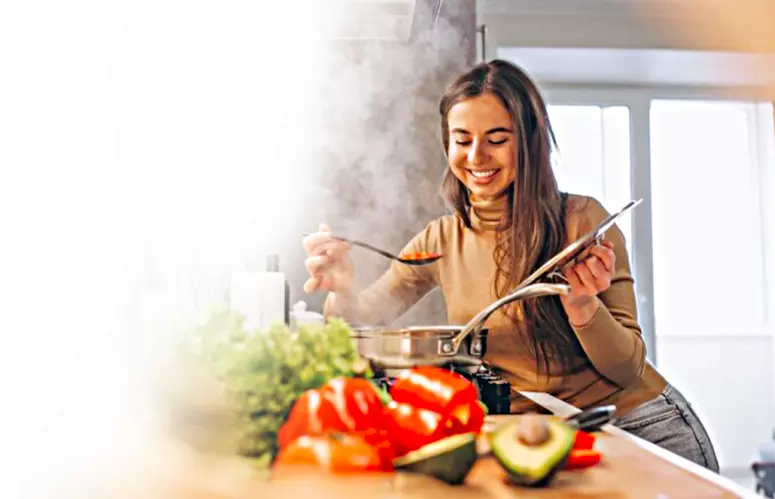Haute Cuisine Or Hexed Kitchen?
From sprinkling salt over shoulder to knife-naming for good luck, kitchen folklores add zest to the food we eat; like or not superstitions simmer beneath the surface where recipes meet rituals

In kitchens around the world—from rustic wood-fired hearths in Himachal to the gleaming counters of Michelin-starred restaurants—something more than ingredients gets stirred into the pot. Behind every perfectly plated dish might be a quiet ritual, a whispered blessing, or a firmly held belief in kitchen folklore. Food and superstition have long simmered together in the same cauldron, and while the world may be embracing molecular gastronomy and AI-powered ovens, the old ways haven’t entirely lost their spice.
Is it haute cuisine—or a hexed kitchen? The answer might depend on whether your chef throws spilled salt over their left shoulder or names their knives for good luck.
‘The Dough Knows’
Reetu Uday Kugaji, renowned culinary expert and consultant, believes every dish she creates carries more than just flavour—it carries faith. “Some dishes turn out perfect not because of the techniques I use, but because of the unsaid prayer I have stirred them into being,” she reflects. One ritual she still follows, passed down by her late mother, is cooking with “shukrana”—gratitude. “Food cooked without thankfulness never satisfies,” her mother would say, pressing her fingers gently to the pot after seasoning it, then to her forehead—a silent blessing before the first bite is ever taken.
Kugaji’s travels through Rajasthan and Himachal Pradesh offered deeper insight into the country’s culinary superstitions. In one village, a Rajasthani cook removed her silver bangles before kneading dough. “The roti needs your warmth, not the chill of metal,”. In Himachal, a pahadi cook warned her that making siddu while angry would cause it to crack—“The dough knows,” she said.
Salt, Spoons, and Spirits
Superstition in cooking isn’t confined to folklore-rich regions—it lives and breathes in high-end kitchens, too. There is magic in the kitchen every day. Chef Tanvi Tangri, sous chef at Marriott, shares, “I’ve worked in places where throwing salt was bad luck—and others where not throwing it over your left shoulder could get you scolded. Either way, salt always came with drama.”
Knives, too, are sacred objects for many chefs. “You’d be surprised how many chefs talk to their knives.
A knife with a name is a knife with a soul.” Some won’t let others touch them at all—it’s not just about blade sharpness, but energy. And then there are stoves. “I once worked under a chef who greeted the stove every morning with ‘Namaste, Agni.’ He swore the fire responded better when respected.”
For Tangri, rituals aren’t always logical—but they work. “If a red thread on my wrist keeps the soufflé from collapsing, I’m wearing it.”
Like it or not, there is emotion, intention, and alchemy, when it comes to cooking. To many chefs, superstition isn’t about fear—it’s about focus and intention. “For me, cooking is an emotion,” Kugaji says. “When done with joy and purity, it turns every bite into a memory, and every meal into a blessing.”
From offering the first roti to a cow, to lighting a diya before the first boil, or even refraining from cooking during eclipses, these practices reflect something more than quirky habits—they reflect a belief that food absorbs the essence of the one who prepares it. “Cooking with love and a pinch of old-world wisdom,” Kugaji adds, “always finds its way to the heart.”
Spill The Beans
Across continents, the overlap of food and folklore is both fascinating and oddly consistent. A few kitchen
superstitions from around the world.
Spilled Salt: In many cultures, it must be flung over the left shoulder to ward off bad luck.
Knives: Never handed directly—placing it on a surface avoids cutting emotional ties.
Whistling While Cooking: Considered an invitation to evil spirits in some traditions.
Clockwise Stirring: Counterclockwise is frowned upon in places like Italy and India—it’s believed to bring misfortune.
Salt First: Always added before other spices in traditional Indian cooking to bless the dish.
Bay Leaves: Used not just for flavour, but to repel negative energy in Mediterranean and South Asian kitchens.
Eggs After Sunset: Avoided by many Indian households for spiritual and digestive reasons.
Hidden Coins in Cakes: British Christmas puddings often contain a coin for luck—whoever finds it may expect fortune in the year ahead.
Talking to Food: Some chefs believe words, emotions, and energy pass into the meal during preparation.

